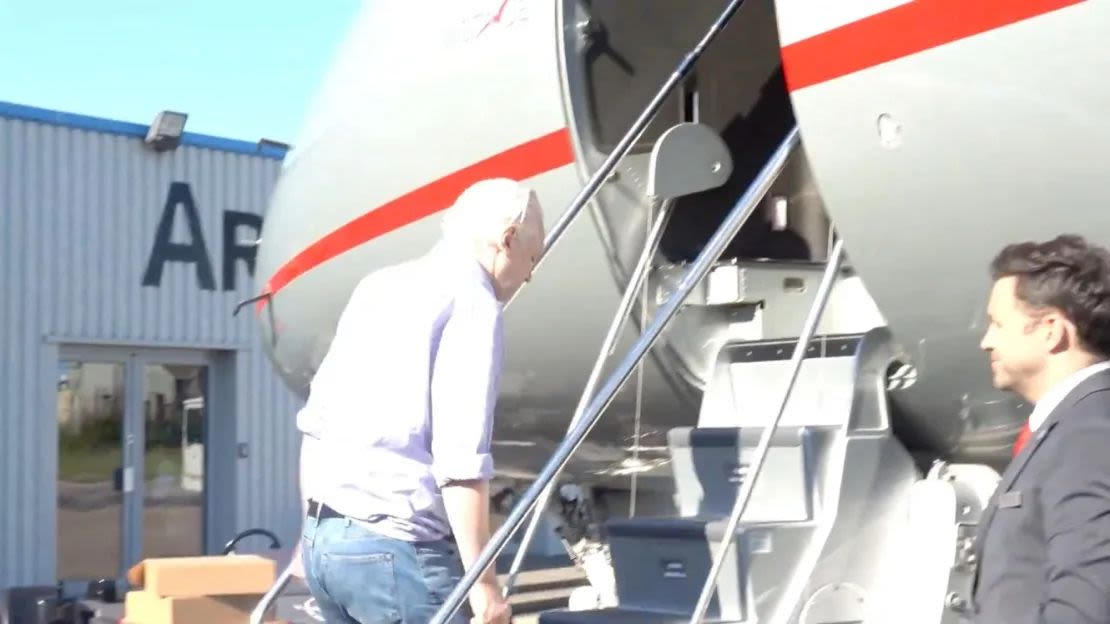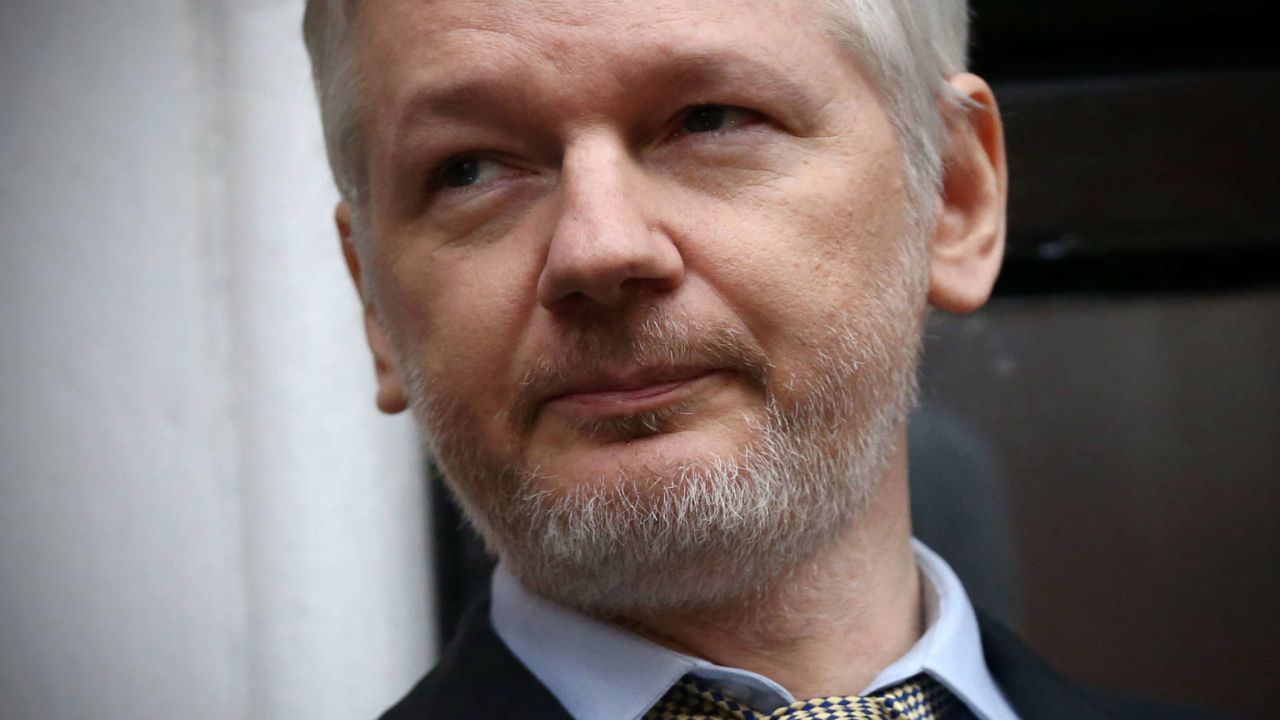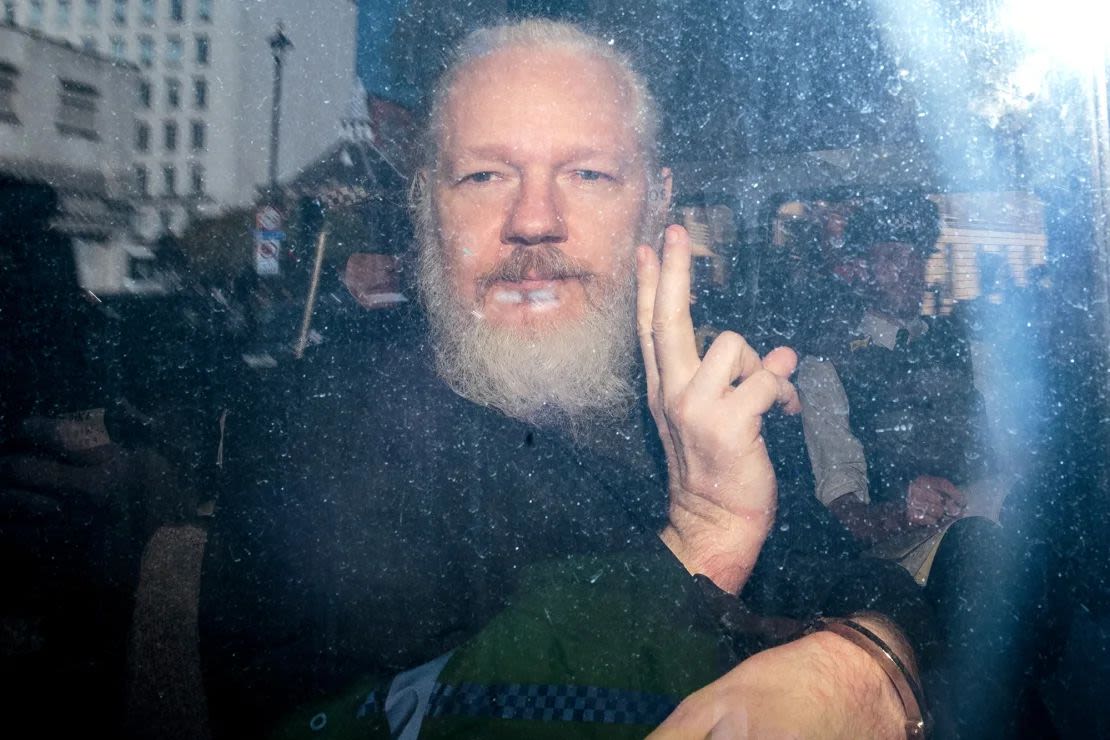() – WikiLeaks founder Julian Assange was released from a British prison on Monday and headed back to his home country, Australia, after his 12-year battle against extradition to the United States ended with a plea deal.
The controversial character has spent the last five years in a high-security prison in the United Kingdom and almost seven years before that sheltered in the Ecuadorian embassy in London, trying to avoid an arrest that could have led to a life sentence.
This Monday, Assange, 52, agreed to plead guilty to a serious crime related to his alleged role in one of the largest leaks of classified material by the US government, after his whistleblowing website published almost half a million documents secret military secrets related to the US wars in Iraq and Afghanistan.
The plea deal ends a long legal saga, allowing Assange to avoid jail in the United States and return to Australia a free man, but not before appearing in court in a remote US territory in the Pacific.
This is what we know.
Assange’s wife: “It will be the first time I will see him as a completely free man”
Assange boarded a flight from London Stansted Airport this Monday after being released on bail, according to a WikiLeaks statement on Tuesday.
“Julian Assange is free,” WikiLeaks said. “He left Belmarsh maximum security prison on the morning of June 24, after having spent 1,901 days there.”
Under the terms of the deal, US Justice Department prosecutors will seek a 62-month sentence, which is equal to the amount of time Assange served in the UK while fighting extradition.

The agreement would credit that time served, allowing Assange to immediately return to Australia. This agreement must still be approved by a federal judge.
Because Assange was reluctant to set foot on the mainland US to enter his guilty plea, a judge will hold the hearing and sentencing together this Wednesday in Saipan, in the Northern Mariana Islands, according to a report. letter presented by prosecutors.
The Pacific island chain is a United States territory located about 6,000 kilometers west of Hawaii and a federal district court is based in its capital, Saipan. The islands are also closer to Australia, a country of which Assange is a citizen and to which he is expected to return after the court hearing, according to prosecutors.

Julian Assange was ‘victim of political persecution’, says press freedom rights activist
US authorities were searching for Assange on espionage charges related to publication on Wikileaks of hundreds of thousands of confidential military and government documents provided by the former Army intelligence analyst Chelsea Manning in 2010 and 2011.
The United States accused Assange of endangering the lives of confidential sources by publishing the unfiltered cables and had been seeking his extradition for years.
He faced 18 charges for his alleged role in the leak and faced a maximum sentence of up to 175 years in prison. British authorities had sought assurances from the United States that the death penalty would not be imposed.
From Townsville, eastern Queensland, Assange launched WikiLeaks in 2006 as an online repository that would publish anonymously submitted material, including the US military’s operating manual for its Guantánamo detention camp and internal documents from the Church of Scientology.
In 2010, WikiLeaks rose to global fame when it published a video claiming to show a deadly 2007 US helicopter attack in Iraq.
Shortly after, WikiLeaks released thousands of classified US military documents related to the Iraq and Afghanistan wars, as well as a set of diplomatic cables.
Assange previously described the documents to as “compelling evidence of war crimes” committed by the US-led coalition and Iraqi government forces.
Assange had long argued that the case against him was politically motivated, that he would not face a fair trial and that his surrender would violate the European Convention on Human Rights.
Free speech advocates condemned the extradition attempt, saying it would have a chilling effect on press freedom.
In August 2010, Assange was charged with sexual assault in Sweden and faced an international arrest warrant. Assange denied the allegations, calling them a “smear campaign” and refused to go to Stockholm for questioning.

He surrendered to the British authorities, but while he was free on bail in 2012 after appealing extradition to Sweden, Assange fled to the Ecuadorian embassy requesting political asylum.
During his stay at the embassy, WikiLeaks continued to release data, as in 2016, when published thousands of emails apparently hacked from the Democratic National Committee and emails stolen from private email account of Hillary Clinton’s campaign chairman, John Podesta, on the eve of the US elections.
But over time, his relationship with his host soured and the president of Ecuador received pressure from the United States to expel him from the diplomatic refuge.
In 2019, Assange was removed from the embassy by London’s Metropolitan Police under an extradition order from the US Department of Justice, and spent the next five years living mostly in isolation, in a 3-by-2 meter cell in Belmarsh Prison.
The prison has capacity for more than 900 inmates and is known for having housed infamous terrorism suspects in its high-security unit, such as cleric Egyptian radical Abu Hamza al-Masri.
Pressure has recently increased to have Assange’s case dismissed.
In May, the High Court of London ruled that Assange had the right to appeal in his last appeal against extradition to the United States, and the President of the United States, Joe Biden, had alluded to a possible agreement promoted by Australian Government officials to return him to Australia.
The UN special rapporteur on torture and Amnesty International were among those who called on the UK to halt the possible extradition, citing concerns about the risk of abuse and other ill-treatment if Assange was sent to the US.
Following his release on Monday, Assange’s wife, Stella Assange, posted on social media: “Julian is free!”
“There are no words to express our immense gratitude to you; Yes, you, who have mobilized for years and years to make this a reality,” he wrote.
The former president of Ecuador, Lenín Moreno, told that he is glad that the founder of Wikileaks is not going to be handed over to the United States. Moreno withdrew Assange’s asylum in April 2019, which had allowed him to remain in the South American country’s embassy in London.
Among those celebrating Assange’s release were the presidents of Colombia and Mexico. “The eternal imprisonment and torture of Assange was an attack against press freedom on a global scale,” said Colombian President Gustavo Petro.
Julian Assange will be a “free man” when the judge signs the agreement, says his wife
Julian Assange will be a “free man” if the judge in the U.S. commonwealth of Saipan signs the plea deal, his wife Stella Assange said Tuesday.
“The important thing here is that the agreement implies time served, that if he signed it, he could walk free,” Stella Assange told BBC Radio 4’s Today programme, speaking from Australia. He did not specify what part of the country he was in.
The only charge, to which Assange is expected to plead guilty, refers to the Espionage Act and the obtaining and dissemination of National Defense information, Stella Assange detailed.
In his interpretation, the “breakthrough” came from Julian Assange’s success on the issue of his rights under constitutional protections of press freedom. “This was the issue that the British courts were going to examine. That’s when we saw a breakthrough regarding an agreement between the parties,” Stella said.
Stella Assange declined to go into further detail about the details of the agreement. “Once the judge signs it, then it’s formally real, so I’m also a little limited as to what I can say right now,” she said.
Stella Assange added that she was “elated” at the news that her husband had been released from Belmarsh prison. “Frankly, it’s incredible. It’s incredible. “It’s like it’s not real,” he said. Assange’s wife flew with their children to Sydney, Australia, on Sunday morning before Assange’s release, he said. Stella Assange did not tell her young children why they were flying to Australia, she said.
–’s Lucas Lilieholm, Manveena Suri, Lauren Said-Moorhouse, Claudia Rebaza, Katelyn Polantz, Holmes Lybrand, Evan Perez, Devan Cole, Mauricio Torres and Stefano Pozzebon contributed to this report.


![[Img #74664]](https://thelatestnews.world/wp-content/uploads/2024/12/James-Watson-The-controversial-genius-behind-the-double-helix-150x150.jpg)










Add Comment